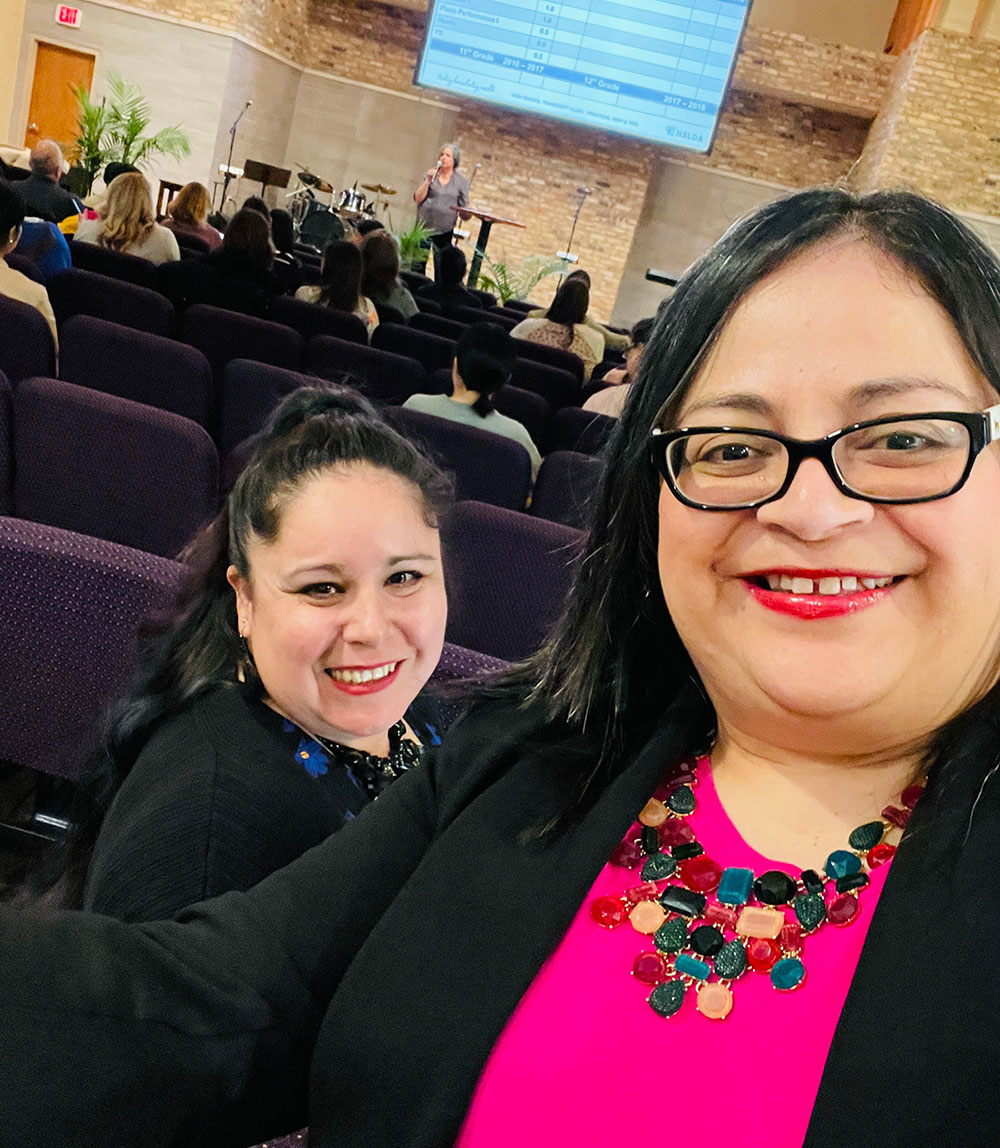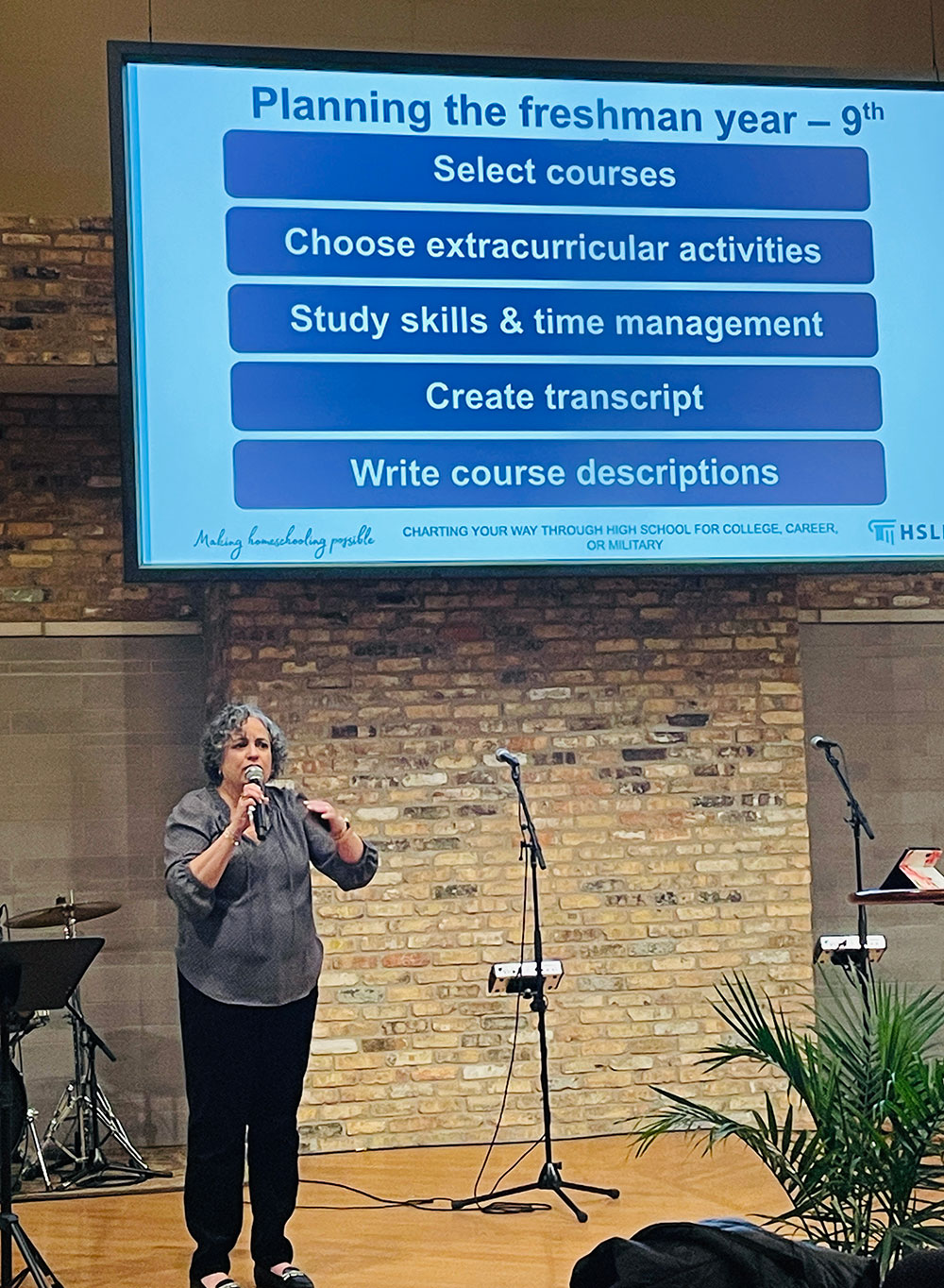In a city renowned for ethnic enclaves with names like Greektown and Little Italy, another community is establishing itself as a cultural touchstone for the way it helps families learn and grow.
Home education continues to expand in Chicago—the nation’s third-largest urban area. And, like the city, Chicago’s homeschooling movement is vibrant and diverse.
As this movement grows, so do its needs. That’s why Veritas Academy, a homeschool co-op that has served a multi-ethnic group of Chicago families for eight years, held its first high school symposium in early April. (The co-op is not connected to Veritas Press in Pennsylvania.)
“It went great,” said Veritas co-founder Christine Parker. The event drew around 40 families who received more than just practical information on how to compile a transcript or help a student apply to college. “We were able to empower more people to realize that they can homeschool through high school,” she said.

HSLDA’s Karim Morato (foreground) and Amy Majors attended the event to provide bilingual support and to share information about our additional services.
A team of HSLDA consultants and staff members took part in the event at the invitation of Veritas leaders. “It was so powerful,” said Karim Morato, HSLDA bilingual educational consultant and Hispanic outreach coordinator. The conference was held in Chicago’s Forest Glen neighborhood.
Clarisa Loparo, HSLDA high school consultant, who led training on high school transcripts and the college application process, said the event was the ideal size for parents to obtain more personalized information. “They could see that they don’t have to have a cookie-cutter educational experience,” she explained.

Clarisa Loparo, a bilingual high school consultant at HSLDA, leads a session on planning for high school.
Meeting Needs
This customized approach to education is an ideal fit for the rich and varied backgrounds of Chicago homeschoolers. Christine estimated that a little more than half of the 40 families who have 150 students enrolled in Veritas are Hispanic. In addition, she said the group is about 15 percent Asian and 15 percent Black.
Many of the Veritas families speak a language other than English at home.
Karim said the co-op’s tapestry of ethnicity, heritage, and dialect was beautifully on display at the event. She provided English-to-Spanish translation, but was delighted to discover an even broader range of languages being used there.
“One mom approached me and asked, ‘When is HSLDA going to hire a Chinese consultant?’” she recalled.
Karim also recounted speaking with a first-generation immigrant—and longtime homeschooler—who still occasionally asks her children to help translate from English to Spanish. The mom told Karim that when her kids were younger, she sometimes felt reluctant to tell people that she homeschooled, because she worried other people would judge her ability to homeschool based on her language limitation.
A lot of Hispanic parents whose first language is Spanish but have English limitations are afraid to homeschool at first, until they realize they can access the right tools and support to facilitate a personalized education in English for their kids. A growing amount of resources offer parents the guidance and context they need in Spanish, with instruction for the kids in English.
“Many parents also come to realize the value of having fluency in two languages,” Karim said. “Rather than see their first language as a liability, they realize it’s a gift.”
Looking to College and Beyond
Like others who attended the symposium, the mom who spoke to Karim wanted to learn how to prepare her children for training and careers beyond high school—including some opportunities she had to forgo.
“She said something that really captured my heart,” Karim recalled.
When Karim asked her how she got the courage to homeschool five kids in this uniquely challenging context, the mom told her she realized her kids could succeed if she was willing to learn alongside them.
“Sometimes we are our own impediment, and we say ‘I can't do it,’” the mom said. “We have to say, ‘Yes I can do it,’ because you can learn together. And I said, 'Yes, I want to learn with my children.’"
Christine added that this desire for expanded knowledge and resources permeated the event, where parents often pitched in during the various sessions with advice in response to questions by other homeschoolers.
Mutual support exemplifies the co-operative model of Veritas, where parents help teach, explained Christine. Many voluntarily serve in other areas as well—from organizing special events, such as the recent “Roman Night” where students presented sights, sounds, and tastes of the ancient world, to supervising fields trips such as the upcoming senior class trip to Tennessee.
The group also takes advantage of the cultural and recreational opportunities provided by a large city, including parks, museums, and art galleries.
Together, co-op members strive to show homeschool students their goals are attainable. And the co-op’s approach is proving effective. Christine said that Veritas families have nine students graduating this year, and all of them have been accepted into the college of their choice. In addition, all nine were awarded scholarships.
“So, yes,” said Christine. “You can homeschool and go to college!”
Financial Support
Another way Veritas empowers families is by showing that home education can be done on a budget.
Christine said that the co-op leadership raises funds to keep member fees low and points families to other organizations that can help. “I don’t want homeschooling to ever be something that people can’t afford to do,” she said.
Amy Majors, HSLDA bilingual grant administrator, attended the Veritas event to share information about resources HSLDA makes available to homeschooling families, such as HSLDA Compassion Curriculum Grants.
The co-op’s emphasis on community echoes the ethos that keeps families homeschooling in the fast-paced, sometimes hard-edged reality of big city life. “God doesn’t intend us to do anything on our own,” Christine said. “We’re intended to rely on each other. And that’s been the journey of Veritas.”
Photo credit: Cover image, iStock. Following images courtesy of Karim Morato.

